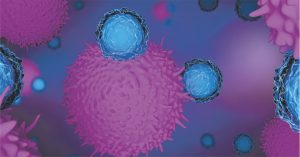

The immune system is a complex collection of organs, including the spleen, thymus and bone marrow, white blood cells, tissues and proteins. These special substances travel through the body, protecting it from germs that cause infection. When it encounters a new substance that it doesn’t recognize, it signals an alarm and works to destroy anything containing the foreign substance.
A closer look at immunotherapy
Cancer starts when normal, healthy cells become changed or altered and begin to grow out of control. Immunotherapies boost or change the immune system to work harder and smarter to find, target and attack cancer cells.
Chemotherapy and radiation have been widely used for decades, and directly target cancer cells. While effective, these treatments can also destroy healthy blood cells and harm the body’s production of new cells.
Immunotherapy may be used alone or in combination with chemotherapy, radiation and/or surgery. While side effects can occur with immunotherapy, a key difference is that they are often less severe than those encountered with conventional therapies.
How immunotherapy works
Immunotherapies work to stimulate or boost the immune system’s natural defenses to work harder to fight cancer. They can be injected directly into a vein, swallowed in pill or capsule form or applied topically through a cream that is rubbed onto the skin.
Some of the most common types of immunotherapies used to treat cancer include:
• Immune checkpoint inhibitors: These are drugs that block immune checkpoints, which are a normal part of the immune system, and allow cells to respond more strongly to cancer.
• CarT-cell therapy: Sometimes talked about as a type of cell-based gene therapy, this involves altering immune cells called T cells (a type of white blood cell) in a laboratory so that they are better able to find and destroy cancer cells. They are placed back into the body intravenously, through a needle in a vein.
• Monoclonal antibodies: These immune system proteins are created in a lab and designed to bind to specific targets on cancer cells. They are then marked so that they will be better seen and destroyed by the immune system.
• Vaccines: These treatments are different than vaccines that help prevent disease; they work against cancer by boosting the body’s response to cancer cells.
In the last few decades Immunotherapy has been approved for the treatment of many cancers, including bladder, cervical, breast, colorectal, lymphoma and melanoma, among others. Patients may receive immunotherapy in a doctor’s office, an oncology clinic or, in some cases, in a hospital setting.
More promise on the horizon
Thanks to ongoing rapid advancements, the outlook for those diagnosed with cancer is becoming brighter all the time. Increasingly, many patients are living with cancer more like a chronic disease than a dim prognosis.
Even though immunotherapy can prevent or slow cancer growth, cancer cells do have ways to avoid destruction by the immune system. New ways of working with the immune system and new immunotherapy treatments are being discovered at a very fast pace.
Researchers are focusing on several major areas to improve immunotherapy. Increased understanding of how cancer cells get around the immune system could lead to the development of new drugs that block those processes. Other areas of focus include finding ways to overcome the body’s resistance to immunotherapy, finding ways to predict which patients will respond best to this form of treatment and ways to reduce the side effects of treatment.
Every person and every cancer is unique. Medical oncologists work with each patient and their entire healthcare team to devise a personalized treatment plan using every resource available to achieve the best possible outcome.
Immunotherapy and other exciting new advancements are leading to the development of truly targeted therapies individualized for each patient’s unique genetic profile. Increasing numbers of cancer survivors are living longer than ever and enjoying all the special moments in life.
World-Class Cancer Treatment
Close to Home
About Florida Cancer Specialists & Research Institute, LLC: (FLCancer.com)
Recognized by the American Society of Clinical Oncology (ASCO) with a national Clinical Trials Participation Award, Florida Cancer Specialists & Research Institute (FCS) offers patients access to more clinical trials than any private oncology practice in Florida. The majority of new cancer drugs recently approved for use in the U.S. were studied in clinical trials with Florida Cancer Specialists participation.*Trained in prestigious medical schools and research institutes, our physicians are consistently ranked nationally as Top Doctors by U.S. News & World Report.
Founded in 1984, Florida Cancer Specialists has built a national reputation for excellence that is reflected in exceptional and compassionate patient care, driven by innovative clinical research, cutting-edge technologies and advanced treatments, including targeted therapies, genomic-based treatment, and immunotherapy. Our highest values are embodied by our outstanding team of highly trained and dedicated physicians, clinicians and staff.
North Port Cancer Center
1390 Grand Venture Drive
North Port, FL 34286
Port Charlotte
22395 Edgewater Drive
Port Charlotte, FL 33980
Venice Island
901 South Tamiami Trail
Venice, FL 34285
Venice HealthPark
836 Sunset Lake Blvd,
Suite 101
Venice, FL 34292
Englewood
714 Doctors Drive
Englewood, FL 34223
For more information, visit FLCancer.com
 Southwest Florida's Health and Wellness Magazine Health and Wellness Articles
Southwest Florida's Health and Wellness Magazine Health and Wellness Articles

